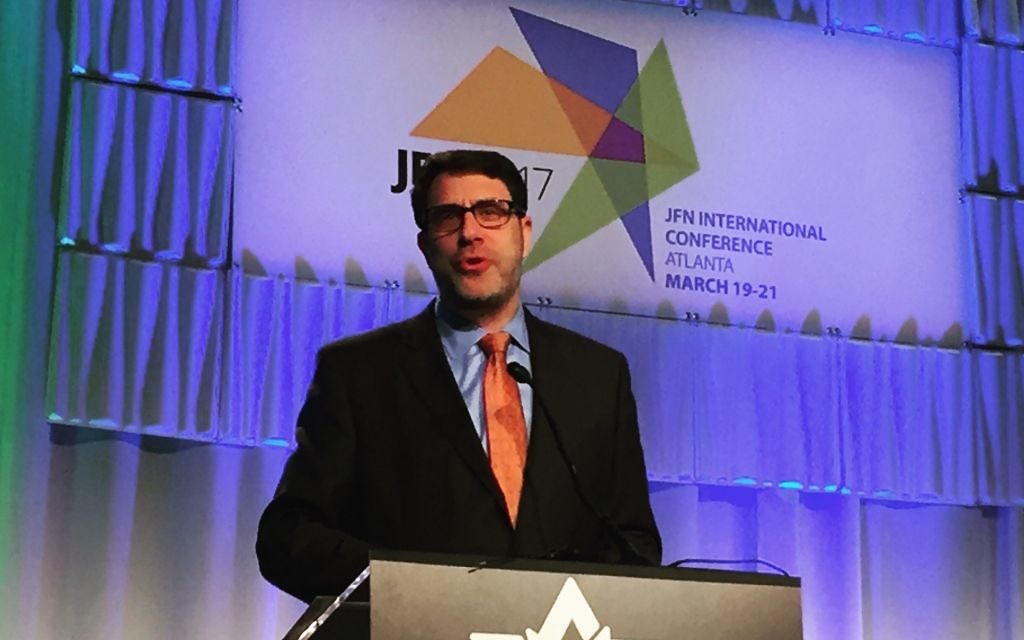Jewish Funders Urged to Embrace Empathy
Attendees encouraged to step out of their comfort zones and use conference as a space for dialogue.

The Jewish Funders Network kicked off its 2017 international conference in Buckhead with a focus on empathy toward philanthropic dialogue within the Jewish community.
JFN CEO and President Andres Spokoiny welcomed people during a first-time attendee networking lunch gathering 450 participants, including 127 first-time attendees and 55 Israelis, for the 27th annual conference.

“The issues that we are dealing with in the Jewish world and the world in general are extremely complex and difficult for a single funder to deal with on his or her own. Even the biggest funders in the Jewish world have to work together because we not only need to aggregate resources, but also our brainpower. We need to embrace diversity, which networking allows us to do,” Spokoiny said.
Get The AJT Newsletter by email and never miss our top stories Free Sign Up
The conference’s opening plenary was geared toward strengthening conversations among individuals within everyday society and addressing the continuing dominance of social media.
Klarman Foundation President Beth Klarman encouraged attendees to step out of their comfort zones and use the three-day conference as a space for dialogue.
“We as philanthropists have a very important choice: to listen, consider and approach new opportunities. … Learning and listening require empathy, and we need to come away from our discussion with an optimistic view,” she said.
Addressing cohesiveness in philanthropy in the Jewish community, Dafna Meitar-Nechmad discussed the importance of giving in the global arena.
“In Israel, philanthropy is not only growing, but becoming stronger, yet everything is not always so rosy,” said Meitar-Nechmad, the president of the Zvi and Ofra Meitar Family Fund. “We still need to adopt new partnerships with various Israeli sectors. … The great thing about JFN is that it advances funding from family foundations and promotes active social improvements.”
Meitar-Nechmad expressed her optimism about future philanthropic endeavors by emphasizing the need to bridge gaps within communities and to help Jews in Israel and nationwide. “We need to focus on things we can achieve vs. things we can’t control.”

Senior Rabbi Peter Berg of The Temple delivered the d’var Torah during the opening plenary and expressed the importance of Judaism in bringing positivity to the world that can and should be. “We live in a world in which we have become aware of so much poverty … and human need that it’s easy for us to feel compassion fatigue. We can’t repair the whole world, and we can’t worry about every needy soul, every natural disaster,” Rabbi Berg said. “This causes us to shut out the world. … But this is not Judaism. The fact that we can’t help anyone is not an excuse for not wanting to help someone.”
He emphasized the need for empathy in embracing diversity and other people’s viewpoints by connecting the conference to Atlanta’s civil rights history as “the city too busy to hate.” He noted that The Temple was bombed in October 1958 because of Rabbi Jacob Rothschild’s public advocacy for racial justice and integration, but Rabbi Rothschild didn’t stop. “He spoke truth to power and modeled empathy for all of Atlanta by his actions and his aspirations.”
The opening plenary focused on the notion of empathy and how social media and technology have dominated people’s everyday conversations toward acceptance.
Keynote speaker Sherry Turkle, the Abby Rockefeller Mauze professor of the social studies of science and technology at the Massachusetts Institute of Technology, addressed the psychological relationship to technology and how it affects funders’ efforts to create meaningful dialogues.
Around 2011, Turkle finished a 15-year study on digital culture and how it has changed daily conversations and relationships among people. Her research led to the discovery of a form of psychology in which people feel isolated and adopt a sense of guilt regardless of connections to numerous people online via social media.

“Social media did not solve every problem,” Turkle said. “We really need each other face to face. We really need to be with each other not just online.”
Over time, people across generations have become more comfortable fleeing conversations that might make them feel vulnerable. In re-examining conversation in America today, Turkle discovered that conversations have become more trivial, and people don’t feel as invested with one another. The empathy gap is dramatic, especially among younger generations.
Throughout her address, Turkle emphasized the need to use technology in a manner that is pro-conversation and a way to retain opportunities. “The crisis of empathy, the crisis of conversation and where we need to repair, says a lot about daily conversations. … Fear of real time, fear of imperfection and technology, makes us forget about life.”
Ongoing conversations may provide a solution, Turkle said. “Conversation is the cure for empathy. We are meant to be empathetic creatures and are artificially suppressing empathetic conversations, or the spiral of silence in which people don’t wish to share opinions due to fear of acceptance by followers. … But it’s time to be optimistic and time to be hopeful.”
She added: “We need more than ever to talk to people that we can respect and learn how to disagree. … Every new technology challenges our human values, which is a good thing because it actually causes us to reflect on these values. … So let’s look up, let’s look at each other and let’s start the conversation. Conversations are essential for communication and help funders understand what they really need and what we can help with.”




comments